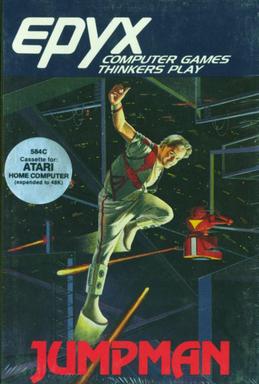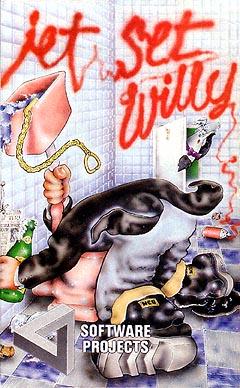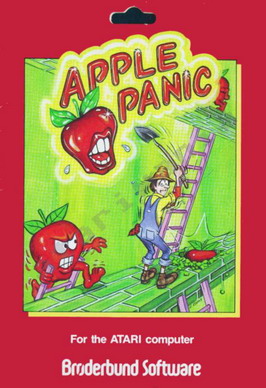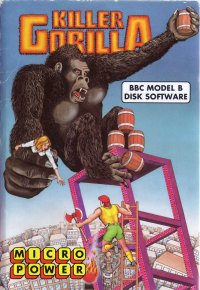
A platformer is a sub-genre of action video games in which the core objective is to move the player character between points in an environment. Platform games are characterized by levels with uneven terrain and suspended platforms of varying height that require jumping and climbing to traverse. Other acrobatic maneuvers may factor into the gameplay, such as swinging from vines or grappling hooks, jumping off walls, gliding through the air, or bouncing from springboards or trampolines.

CP/M, originally standing for Control Program/Monitor and later Control Program for Microcomputers, is a mass-market operating system created in 1974 for Intel 8080/85-based microcomputers by Gary Kildall of Digital Research, Inc. CP/M is a disk operating system and its purpose is to organize files on a magnetic storage medium, and to load and run programs stored on a disk. Initially confined to single-tasking on 8-bit processors and no more than 64 kilobytes of memory, later versions of CP/M added multi-user variations and were migrated to 16-bit processors.

Jumpman is a platform game written by Randy Glover and published by Epyx in 1983. It was developed for the Atari 8-bit computers, and versions were also released for the Commodore 64, Apple II, and IBM PC compatibles.
Kaypro Corporation was an American home and personal computer manufacturer based in Solana Beach in the 1980s. The company was founded by Non-Linear Systems (NLS) to compete with the popular Osborne 1 portable microcomputer. Kaypro produced a line of rugged, "luggable" CP/M-based computers sold with an extensive software bundle which supplanted its competitors and quickly became one of the top-selling personal computer lines of the early 1980s.

Jet Set Willy is a platform video game written by Matthew Smith for the ZX Spectrum home computer. It was published in 1984 by Software Projects and ported to most home computers of the time.

Lode Runner is a 2D puzzle-platform game, developed by Doug Smith and published by Broderbund in 1983. Its gameplay mechanics are similar to Space Panic from 1980. The player controls a character who must collect all the gold pieces in a level and get to the end while being chased by a number of enemies. It is one of the first games to include a level editor.

Montezuma's Revenge is a platform game for the Atari 8-bit computers, Atari 2600, Atari 5200, Apple II, ColecoVision, Commodore 64, IBM PC, and ZX Spectrum. It was designed and programmed by Robert Jaeger and published by Parker Brothers in 1984. The game's title references a colloquial expression for diarrhea contracted while visiting Mexico.

Pitfall II: Lost Caverns is a video game developed by David Crane for the Atari 2600. It was released in 1984 by Activision. The player controls Pitfall Harry, who must explore in wilds of Peru to find the Raj Diamond, and rescue his niece Rhonda and their animal friend Quickclaw. The game world is populated by enemies and hazards that variously cause the player to lose points and return to a checkpoint.

Ricochet is an action-adventure game for the BBC Micro and Acorn Electron home computers, published by Superior Software in 1989. It was written by Neil Davidson and David Williams with some graphics work and level design by Nik Weston and Guy Burt.

Apple Panic is a game for the Apple II programmed by Ben Serki and published by Broderbund Software in 1981. Apple Panic is an unauthorized version of the 1980 arcade game Space Panic, the first game with ladders and platforms. While the arcade original remained obscure, Apple Panic became a top seller for home computers. It was ported to the Atari 8-bit computers, VIC-20, IBM PC, and TRS-80.
Secrets of the Cryptkeeper's Haunted House is a children's Saturday-morning game show that ran on CBS. It premiered on September 14, 1996, and lasted until August 23, 1997. It featured the Cryptkeeper of Tales from the Crypt now serving as an announcer. It is the last TV series in the Tales From the Crypt franchise. The series was taped at Universal Studios Florida.

Door Door is a single-screen puzzle-platform game by Enix published in Japan in 1983. Originally released for the NEC PC-8801, it was ported to other platforms, including the Family Computer. Controlling a small character named Chun, the player is tasked with completing each stage by trapping different kinds of aliens behind sliding doors. Chun can jump over the aliens and climb ladders, and must also avoid obstacles such as large nails and bombs.

The Pippin is a defunct open multimedia technology platform, designed by Apple Computer. According to Apple, Pippin was directed at the home market as "an integral part of the consumer audiovisual, stereo, and television environment".

A personal computer, often referred to as a PC, is a computer designed for individual use. It is typically used for tasks such as word processing, internet browsing, email, multimedia playback, and gaming. Personal computers are intended to be operated directly by an end user, rather than by a computer expert or technician. Unlike large, costly minicomputers and mainframes, time-sharing by many people at the same time is not used with personal computers. The term home computer has also been used, primarily in the late 1970s and 1980s. The advent of personal computers and the concurrent Digital Revolution have significantly affected the lives of people.

In computing, an emulator is hardware or software that enables one computer system to behave like another computer system. An emulator typically enables the host system to run software or use peripheral devices designed for the guest system. Emulation refers to the ability of a computer program in an electronic device to emulate another program or device.

Killer Gorilla is a Donkey Kong clone written by Adrian Stephens and published by Micro Power for the BBC Micro in 1983. It was ported to the Acorn Electron and Amstrad CPC computers in 1984.
S-BASIC was a "structured" BASIC variant, distributed with Kaypro CP/M systems. It was made by Topaz Programming is distributed by Micro-Ap.

CatChum is a text-only clone of Pac-Man written for the CP/M operating system and made to be operated on the early Kaypro line of luggable computers.

Aliens is a text-only clone of Space Invaders written for the CP/M operating system and made to be operated on the early Kaypro line of luggable computers. It was written by Yahoo Software of Los Angeles, California. Along with Star Trek, CatChum, and Ladder, Aliens was one of the games that came with the early Kaypro computers.
Yahoo Software was an early developer of computer software. During the 1980s, Yahoo Software created the games which were bundled with the early line of Kaypro "luggable" computers. These games include Ladder, CatChum, Aliens and Star Trek.
















